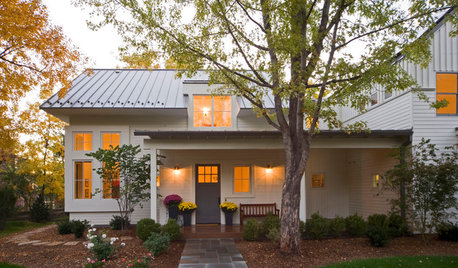Limiting Home Equity to no more than 25% of Appraised Value, WHY?
saphire
17 years ago
Related Stories

BEFORE AND AFTERSA ‘Brady Bunch’ Kitchen Overhaul for Less Than $25,000
Homeowners say goodbye to avocado-colored appliances and orange-brown cabinets and hello to a bright new way of cooking
Full Story
SELLING YOUR HOUSE10 Ways to Boost Your Home's Resale Value
Figure out which renovations will pay off, and you'll have more money in your pocket when that 'Sold' sign is hung
Full Story
GREEN BUILDINGInsulation Basics: Heat, R-Value and the Building Envelope
Learn how heat moves through a home and the materials that can stop it, to make sure your insulation is as effective as you think
Full Story
MOST POPULAR5 Remodels That Make Good Resale Value Sense — and 5 That Don’t
Find out which projects offer the best return on your investment dollars
Full Story
GREAT HOME PROJECTSUpgrade Your Front Yard for Curb Appeal and More
New project for a new year: Revamp lackluster landscaping for resale value, water savings and everyday enjoyment
Full Story
GREAT HOME PROJECTS25 Great Home Projects and What They Cost
Get the closet of your dreams, add a secret doorway and more. Learn the ins and outs of projects that will make your home better
Full Story
SELLING YOUR HOUSEHelp for Selling Your Home Faster — and Maybe for More
Prep your home properly before you put it on the market. Learn what tasks are worth the money and the best pros for the jobs
Full Story
KITCHEN DESIGNTrick Out Your Kitchen Backsplash for Storage and More
Free up countertop space and keep often-used items handy by making your backsplash more resourceful
Full Story
INSIDE HOUZZHouzz Survey: See the Latest Benchmarks on Remodeling Costs and More
The annual Houzz & Home survey reveals what you can expect to pay for a renovation project and how long it may take
Full Story
GREAT HOME PROJECTSHow to Give Your Driveway and Front Walk More Curb Appeal
Prevent injuries and tire damage while making a great first impression by replacing or repairing front paths
Full StoryMore Discussions



celticmoon
saphireOriginal Author
Related Discussions
More appraisal woes - any suggestions on how to proceed?
Q
Best way to increase appraisal value of land- pole barn or pond?
Q
Market 'assessed' value vs. appraised value
Q
Appraisal Value a Good Deal?
Q
celticmoon
C Marlin
punamytsike
C Marlin
C Marlin
celticmoon
talley_sue_nyc
punamytsike
C Marlin
joyfulguy
C Marlin
C Marlin
celticmoon
joyfulguy
chelone
celticmoon
chelone
saphireOriginal Author
C Marlin
saphireOriginal Author
C Marlin
C Marlin
celticmoon
dave_donhoff
chelone
chelone
dave_donhoff